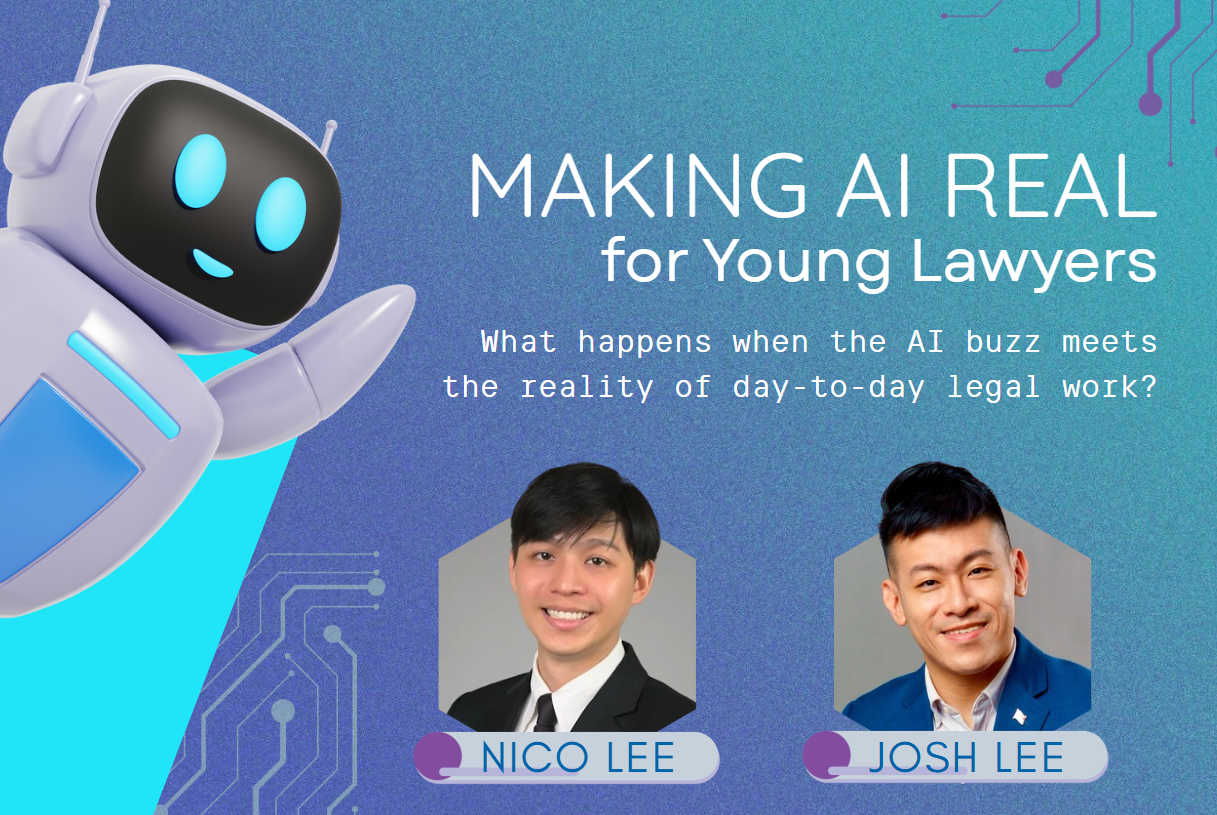
Published in:
Tips & Guides
Making AI Real for Young Lawyers
The conversation around legal tech and AI is louder than ever. But for many young lawyers, it can feel like background noise – full of potential yet far removed from the realities of daily practice. Access to secure, reliable AI tools remains limited in many workplaces, leaving junior lawyers watching from the sidelines.
So, what does it look like when young legal professionals actually get their hands on AI? Here’s a snapshot from three different corners of the legal world.
The Young Partner: Using AI to Focus on What Matters
For Nico Lee, 33, starting his own law firm, Triangle Legal LLC, meant juggling everything – working with clients, running litigations, advising corporates, and keeping an office operating. That is where AI comes in. “Attention is the most limited resource when you’re running a firm,” he says. “AI isn’t about cutting corners. It is about freeing up bandwidth to pay attention to high-order matters like case strategy and client service.” In disputes work, AI tools assist Nico in reviewing court decisions, summarising precedent, and generating initial drafts. On the corporate side, AI-assisted tools have helped streamline contract review which frees Nico up to consider commercial intent and structure, instead of getting bogged down in boilerplate. He’s clear that AI doesn’t replace lawyers, it supports them. He has strict internal rules including that no client data should be uploaded to public AI platforms, and all AI output is always reviewed and refined by a human. “The responsibility ultimately remains with us, not the tools. AI can only support, not replace, sound legal and human judgment.” As Nico grows his firm, he is building a culture that is open to innovation but grounded on the fundamentals: good lawyering, thoughtful client service, and professional integrity.The Legal Technologist: Systems Thinking for the Next Generation
Josh Lee, Managing Director (APAC) of the Future of Privacy Forum and founder of LawTech.Asia, takes a systems-level view. His message to young lawyers is clear: “The world will not stop shifting under our feet,” he says. “We need to rethink how we train young lawyers and how, in the age of generative and agentic AI, we cultivate T-shaped professionals who can draw from legal doctrine, technology, and strategic insight to serve society meaningfully.” For Josh, it is not just about coding bootcamps or giving everyone access to AI tools. Josh favours a holistic and integrated approach over a piecemeal one: one that includes ethical guardrails, governance and regulatory oversight, and a renewed commitment to ensure that technology amplifies access to justice. At the same time, he supports experimentation by young lawyers: “They are digitally familiar, intuitively collaborative, and eager to find better ways to serve.” “AI is a wake-up call for the kind of legal community we want to build,” he says. “If we want to uphold our ideals of service to the community, we need to move faster and train more broadly. We mustn’t just help young lawyers adapt to change – we need to actively involve them in shaping it.”The Young In-House Counsel: Don’t Outsource Your Thinking
One in-house counsel we spoke to sounded a word of caution. For him, there are the echoes of outsourcing trends that once promised savings but just added rework and inefficiency. “AI savings look good on paper, but spotting hallucinations and verifying inaccurate outputs can create even more work. Rather than being transformative, that is inefficiency in disguise.” More worrying is the creeping tendency to outsource cognitive work to machines. “Legal reasoning is not a task you delegate. We’re seeing users relying on AI to tell them what to think. That’s is atrophy, not efficiency. Every time we offload reasoning and judgment to a machine, we erode our intellectual sharpness. Legal thinking and advocacy aren’t just tasks. They’re core to who we are as a profession.” Instead, he urges young lawyers to master prompt engineering and refine weak outputs. “You can offload the grunt work and free yourself to focus on the work that matters but double down on what AI cannot do – advocacy, client empathy and strategic writing. This is your value-add as young lawyers.”What’s Next
There’s no shortage of talent, drive, or imagination among young lawyers. But many are still working in environments that have not made meaningful investments in accessible, secure AI tools. That needs to change. It’s time to move beyond hype and articulate a clear vision – one where young lawyers are not just trying to keep up but are equipped to lead. AI will not provide that vision. It starts with leadership, intentionality, and a commitment to shaping the next chapter of our profession together.

